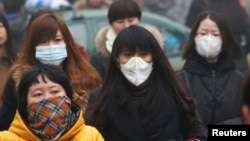French President Francois Hollande is warning that December's global warming conference in Paris could be the last chance to save the Earth.
"In Paris, we will be asking one question," he told the U.N. General Assembly Monday. "Is humankind capable of deciding if we will preserve life on this planet? If we don't make this decision in Paris... it will be too late for the world."
Delegates in Paris will seek agreement on how much to cut greenhouse gas emissions blamed for causing the global climate to get dangerously warmer.
While just about every major world leader agrees that something must be done, there are still big differences over the costs of taking action.
Developing nations say the wealthier countries are the major polluters and should be most responsible for the economic costs of a plan while some wealthier countries want developing nations to pay their fair share. Many governments do not want to be tied down to mandatory emission quotas.
U.S. President Barack Obama met with Indian Prime Minister Narendra Modi at the U.N. Monday, thanking the Indian leader on his commitment to clean energy.
Modi said he and Obama "share an uncompromising commitment on climate change." India's plan to fight global warming is expected to stress renewable energy and green transportation to cut pollution from cars, trucks and busses.
Also Monday, the U.N. awarded its Champions of the Earth prize -- its highest environmental award -- to Bangladesh Prime Minister Sheikh Hasina.
The U.N. says Bangladesh is the first country to establish its own climate change trust fund, setting aside up to 7 percent of annual spending just to fight global warming. This includes four million solar-powered homes and food security for 160 million people.
In accepting the prize, Hasina said, the "people of Bangladesh believe that conservation and protection of the environment is a time-honored responsibility."
U.N. experts say nations must to agree to stop temperatures from rising beyond 2 degrees Celsius from pre-industrial levels.
Scientists caution that a warmer planet could bring stronger storms, catastrophic floods and rising sea levels. Some island nations and coastal cities could disappear, while other parts of the world would face extreme drought.





